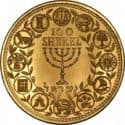
Parashat Mishpatim: Shekels make the world go ’round…
This week is the first of four special Shabbatot that take place near the holidays of Purim and Passover: Shekalim, Zachor, Parah, HaChodesh.
Shabbat Shekalim, which is this Shabbat, falls each year on the Shabbat directly on/before Rosh Chodesh Adar (the start of the month of Adar, which includes Purim). We read our Torah portion, Mishpatim (Exodus 21:1-24:18), an extra few verses from Exodus are added on (Exodus 30:11-16) and our Haftarah portion shifts to the special text specified for Shabbat Shekalim (II Kings 12:1-17).
So, what is this special Shabbat all about? It is meant to be part of our preparations for the festival of Purim, traditionally a very well-attended event for the community. Thus, this Shabbat is a public reminder to all of the adult male Jews that their half-shekel contribution to the upkeep of the Temple/Synagogue is due before the 1st of Nisan – one month away. The text from Exodus 30 explains the half-shekel tax. The Haftarah portion, which features King Jehoash, reiterates the importance of regular donations to the Temple/Synagogue for maintenance, repairs, etc.
Rabbi Beth Jacowitz Chottiner explains,
The Mishna, codified around 200 C.E. also speaks about this practice. It says: “On the first day of Adar they give warning of the Shekel dues. On the 15th thereof, they read the Megilla in walled cities (meaning the scroll of Esther); and repair the paths and roads and pools of water.” (Shekalim 1:1)
The paths and roads needed to be repaired after the winter rains in readiness for the Passover pilgrimage to Jerusalem, and the pools of water, or mikvas, needed to be equipped in a fashion that would make them kosher, or valid. So again, even though the dues technically needed to be paid by the first of Nisan, the announcement began in Adar. As a result of this ruling by the rabbis, it became customary on the Shabbat before the first of Adar, to read from two Torah scrolls — the weekly Torah portion from one and the verses about paying the half-shekel, from the other.
The shekalim also recall the 10,000 talents of silver which Haman offers King Achasverosh to pay for the destruction of the Jews (Esther 3:9). In a sense, then, we are redeeming ourselves through the collection of charity and the upkeep of our own spiritual lives.
This half-shekel tax was due from every single family – no distinction was made between rich and poor. Every member of the community is equally responsible for taking care of our holy space. Even after the diaspora and as Jews spread around the world, we’ve maintained the idea that we must contribute our share to the Jewish community and to our physical structures.
This is all-too-modern a phenomenon, and I’m sure that all of you who have served as synagogue leadership can relate to these texts. Together, we’ll examine the other laws set forth in Parashat Mishpatim (including rules related to servitude, the verse which leads to our beliefs about abortion, “eye for an eye,” and so many more), while taking plenty of time to discuss our extra readings for this special Shabbat. I look forward to studying with you all!





